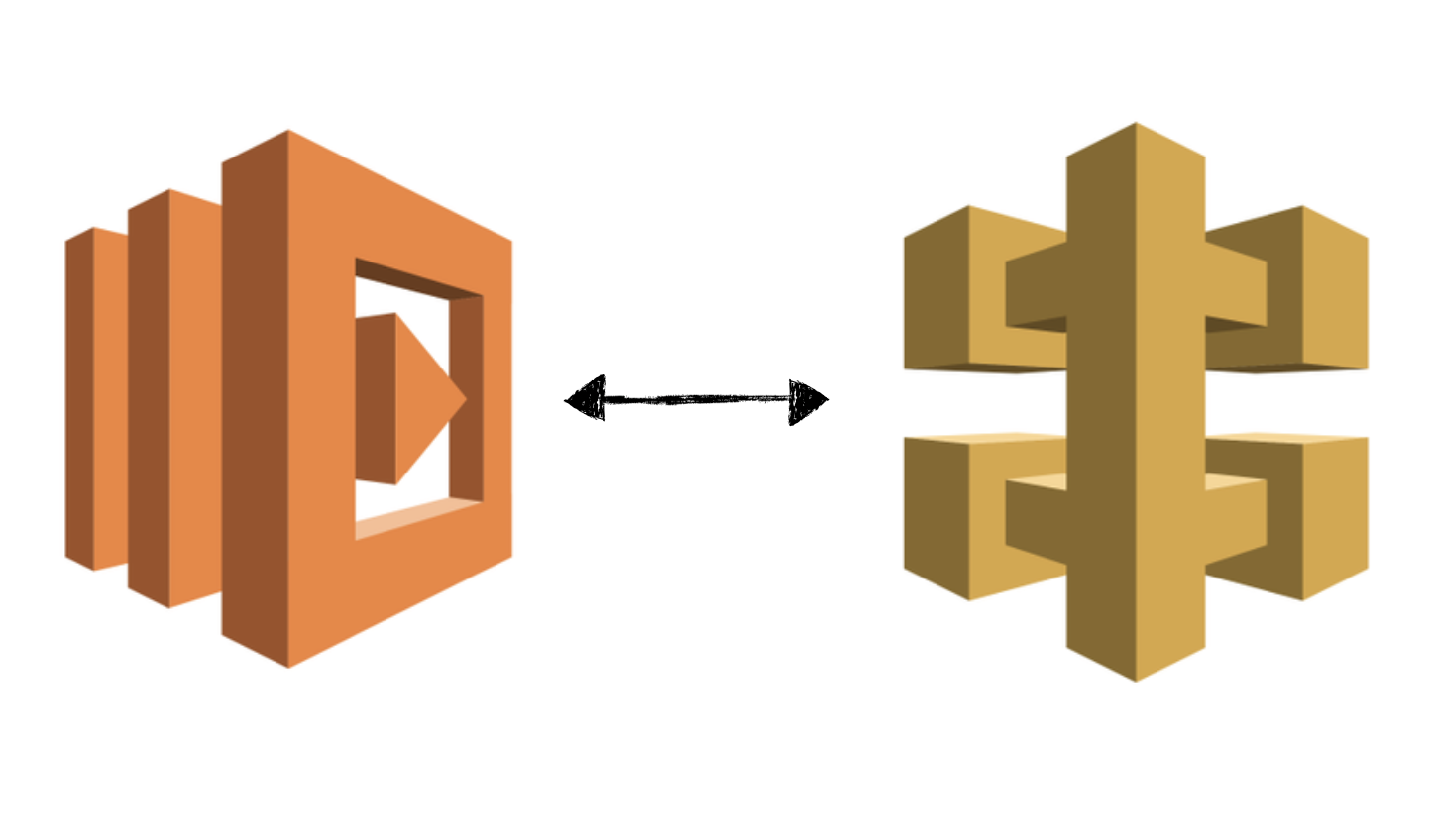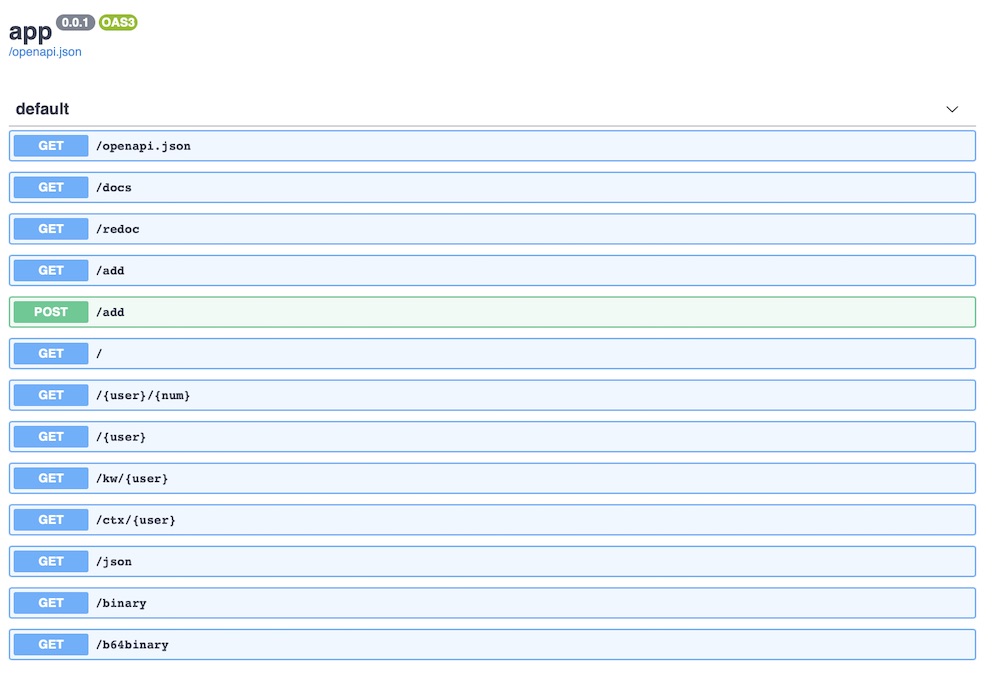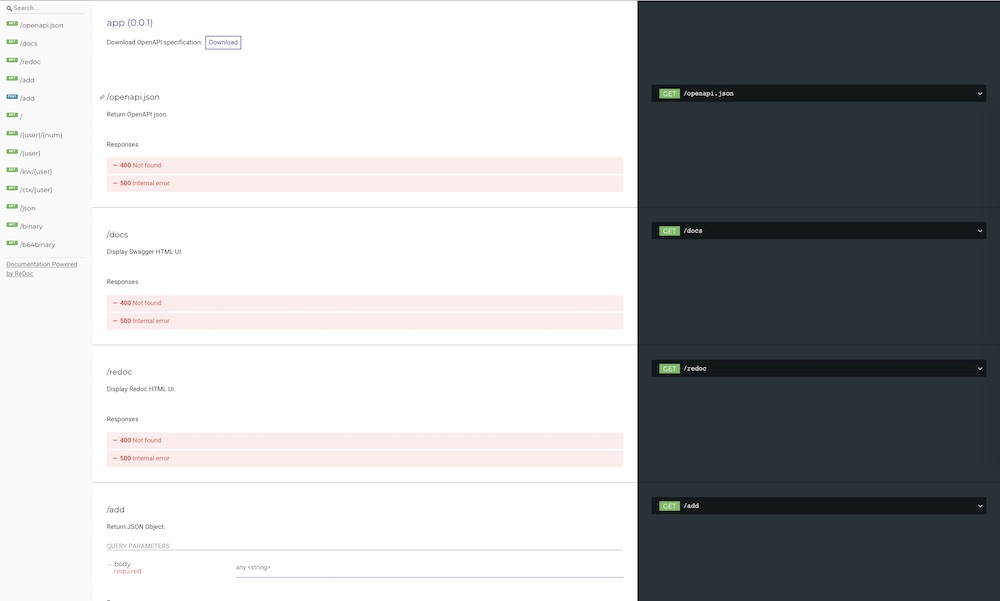Simple AWS Lambda proxy to handle API Gateway request
Project description
lambda-proxy
A zero-requirement proxy linking AWS API Gateway {proxy+} requests and AWS Lambda.

Install
$ pip install -U pip
$ pip install lambda-proxy
Or install from source:
$ git clone https://github.com/vincentsarag/lambda-proxy.git
$ cd lambda-proxy
$ pip install -U pip
$ pip install -e .
Usage
Lambda proxy is designed to work well with both API Gateway's REST API and the newer and cheaper HTTP API. If you have issues using with the HTTP API, please open an issue.
With GET request
from lambda_proxy.proxy import API
APP = API(name="app")
@APP.route('/test/tests/<id>', methods=['GET'], cors=True)
def print_id(id):
return ('OK', 'plain/text', id)
With POST request
from lambda_proxy.proxy import API
APP = API(name="app")
@APP.route('/test/tests/<id>', methods=['POST'], cors=True)
def print_id(id, body):
return ('OK', 'plain/text', id)
Note
Starting in version 5.2.0, users can now add route using @APP.get and @APP.post removing the need to add methods=[**]
Binary body
Starting from version 5.0.0, lambda-proxy will decode base64 encoded body on POST message.
Pre 5.0.0
from lambda_proxy.proxy import API
APP = API(name="app")
@APP.route('/test', methods=['POST']e)
def print_id(body):
body = json.loads(base64.b64decode(body).decode())
Post 5.0.0
from lambda_proxy.proxy import API
APP = API(name="app")
@APP.route('/test', methods=['POST']e)
def print_id(body):
body = json.loads(body)
Routes
Route schema is simmilar to the one used in Flask
Variable parts in the route can be specified with angular brackets
/user/<username>. By default a variable part in the URL accepts any string without a slash however a different converter can be specified as well by using<converter:name>.
Converters:
int: integerstring: stringfloat: float numberuuid: UUID
example:
/app/<user>/<id>(userandidare variables)/app/<string:value>/<float:num>(valuewill be a string, whilenumwill be a float)
Regex
You can also add regex parameters descriptions using special converter regex()
example:
@APP.get("/app/<regex([a-z]+):regularuser>")
def print_user(regularuser):
return ('OK', 'plain/text', f"regular {regularuser}")
@APP.get("/app/<regex([A-Z]+):capitaluser>")
def print_user(capitaluser):
return ('OK', 'plain/text', f"CAPITAL {capitaluser}")
Warning
when using regex() you must use different variable names or the route might not show up in the documentation.
@APP.get("/app/<regex([a-z]+):user>")
def print_user(user):
return ('OK', 'plain/text', f"regular {user}")
@APP.get("/app/<regex([A-Z]+):user>")
def print_user(user):
return ('OK', 'plain/text', f"CAPITAL {user}")
This app will work but the documentation will only show the second route because in openapi.json, route names will be /app/{user} for both routes.
Route Options
- path: the URL rule as string
- methods: list of HTTP methods allowed, default: ["GET"]
- cors: allow CORS, default:
False - token: set
access_tokenvalidation - payload_compression_method: Enable and select an output body compression
- binary_b64encode: base64 encode the output body (API Gateway)
- ttl: Cache Control setting (Time to Live) (Deprecated in 6.0.0)
- cache_control: Cache Control setting
- description: route description (for documentation)
- tag: list of tags (for documentation)
Cache Control
Add a Cache Control header with a Time to Live (TTL) in seconds.
from lambda_proxy.proxy import API
APP = API(app_name="app")
@APP.get('/test/tests/<id>', cors=True, cache_control="public,max-age=3600")
def print_id(id):
return ('OK', 'plain/text', id)
Note: If function returns other then "OK", Cache-Control will be set to no-cache
Binary responses
When working with binary on API-Gateway we must return a base64 encoded string
from lambda_proxy.proxy import API
APP = API(name="app")
@APP.get('/test/tests/<filename>.jpg', cors=True, binary_b64encode=True)
def print_id(filename):
with open(f"{filename}.jpg", "rb") as f:
return ('OK', 'image/jpeg', f.read())
Compression
Enable compression if "Accept-Encoding" if found in headers.
from lambda_proxy.proxy import API
APP = API(name="app")
@APP.get(
'/test/tests/<filename>.jpg',
cors=True,
binary_b64encode=True,
payload_compression_method="gzip"
)
def print_id(filename):
with open(f"{filename}.jpg", "rb") as f:
return ('OK', 'image/jpeg', f.read())
Simple Auth token
Lambda-proxy provide a simple token validation system.
- a "TOKEN" variable must be set in the environment
- each request must provide a "access_token" params (e.g curl http://myurl/test/tests/myid?access_token=blabla)
from lambda_proxy.proxy import API
APP = API(name="app")
@APP.get('/test/tests/<id>', cors=True, token=True)
def print_id(id):
return ('OK', 'plain/text', id)
URL schema and request parameters
QueryString parameters are passed as function's options.
from lambda_proxy.proxy import API
APP = API(name="app")
@APP.get('/<id>', cors=True)
def print_id(id, name=None):
return ('OK', 'plain/text', f"{id}{name}")
requests:
$ curl /000001
0001
$ curl /000001?name=vincent
0001vincent
Multiple Routes
from lambda_proxy.proxy import API
APP = API(name="app")
@APP.get('/<id>', cors=True)
@APP.get('/<id>/<int:number>', cors=True)
def print_id(id, number=None, name=None):
return ('OK', 'plain/text', f"{id}-{name}-{number}")
requests:
$ curl /000001
0001--
$ curl /000001?name=vincent
0001-vincent-
$ curl /000001/1?name=vincent
0001-vincent-1
Advanced features
Context and Event passing
Pass event and context to the handler function.
from lambda_proxy.proxy import API
APP = API(name="app")
@APP.get("/<id>", cors=True)
@APP.pass_event
@APP.pass_context
def print_id(ctx, evt, id):
print(ctx)
print(evt)
return ('OK', 'plain/text', f"{id}")
Automatic OpenAPI documentation
By default the APP (lambda_proxy.proxy.API) is provided with three (3) routes:
-
/openapi.json: print OpenAPI JSON definition -
/docs: swagger html UI -
/redoc: Redoc html UI
Function annotations
To be able to render full and precise API documentation, lambda_proxy uses python type hint and annotations link.
from lambda_proxy.proxy import API
APP = API(name="app")
@APP.route('/test/<int:id>', methods=['GET'], cors=True)
def print_id(id: int, num: float = 0.2) -> Tuple(str, str, str):
return ('OK', 'plain/text', id)
In the example above, our route /test/<int:id> define an input id to be a INT, while we also add this hint to the function print_id we also specify the type (and default) of the num option.
Custom Domain and path mapping
Since version 4.1.1, lambda-proxy support custom domain and path mapping (see https://github.com/vincentsarago/lambda-proxy/issues/16).
Note: When using path mapping other than root (/), / route won't be available.
from lambda_proxy.proxy import API
api = API(name="api", debug=True)
# This route won't work when using path mapping
@api.get("/", cors=True)
# This route will work only if the path mapping is set to /api
@api.get("/api", cors=True)
def index():
html = """<!DOCTYPE html>
<html>
<header><title>This is title</title></header>
<body>
Hello world
</body>
</html>"""
return ("OK", "text/html", html)
@api.get("/yo", cors=True)
def yo():
return ("OK", "text/plain", "YOOOOO")
Plugin
- Add cache layer: https://github.com/vincentsarago/lambda-proxy-cache
Examples
- https://github.com/vincentsarago/lambda-proxy/tree/master/example
- https://github.com/RemotePixel/remotepixel-tiler
Contribution & Devellopement
Issues and pull requests are more than welcome.
Dev install & Pull-Request
$ git clone https://github.com/vincentsarago/lambda-proxy.git
$ cd lambda-proxy
$ pip install -e .[dev]
Python3.7 only
This repo is set to use pre-commit to run mypy, flake8, pydocstring and black ("uncompromising Python code formatter") when committing new code.
$ pre-commit install
$ git add .
$ git commit -m'my change'
black.........................Passed
Flake8........................Passed
Verifying PEP257 Compliance...Passed
mypy..........................Passed
$ git push origin
License
See LICENSE.txt.
Authors
See AUTHORS.txt.
Changes
See CHANGES.txt.
Project details
Release history Release notifications | RSS feed
Download files
Download the file for your platform. If you're not sure which to choose, learn more about installing packages.
Source Distribution
File details
Details for the file lambda-proxy-5.2.1.tar.gz.
File metadata
- Download URL: lambda-proxy-5.2.1.tar.gz
- Upload date:
- Size: 17.4 kB
- Tags: Source
- Uploaded using Trusted Publishing? No
- Uploaded via: twine/3.1.1 pkginfo/1.5.0.1 requests/2.23.0 setuptools/40.8.0 requests-toolbelt/0.9.1 tqdm/4.46.0 CPython/3.7.2
File hashes
| Algorithm | Hash digest | |
|---|---|---|
| SHA256 | 6d4a1323c2fdd59d97a57338efe8b9db4283ac7c51d295c9b4f55cfe1b055634 |
|
| MD5 | ad05428e3cce7620ddeb24f4b1f57099 |
|
| BLAKE2b-256 | 577958a6927147afd1ce541c0c4ea950479cbb4224624ee2b641990a90f01359 |
















